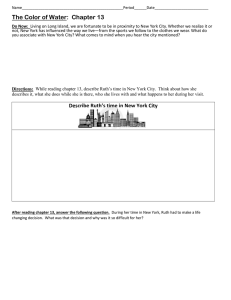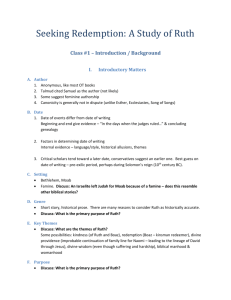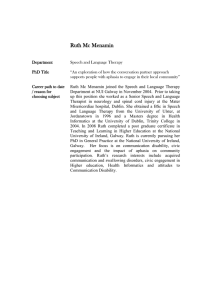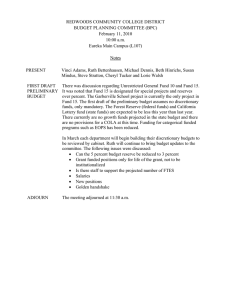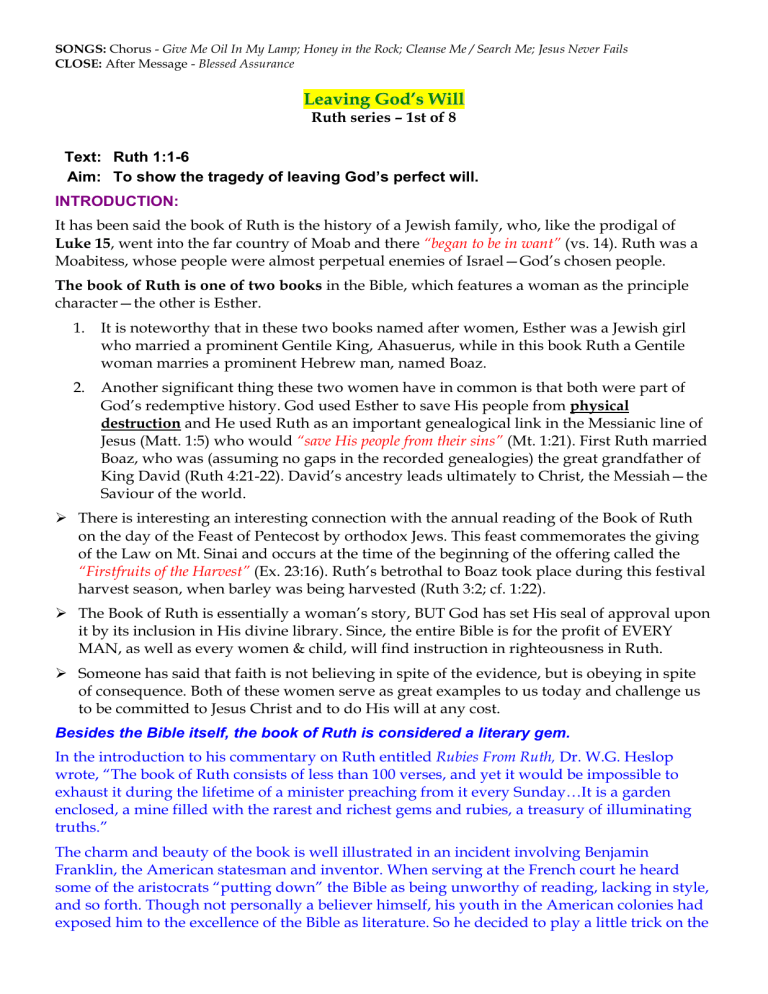
SONGS: Chorus - Give Me Oil In My Lamp; Honey in the Rock; Cleanse Me / Search Me; Jesus Never Fails CLOSE: After Message - Blessed Assurance Leaving God’s Will Ruth series – 1st of 8 Text: Ruth 1:1-6 Aim: To show the tragedy of leaving God’s perfect will. INTRODUCTION: It has been said the book of Ruth is the history of a Jewish family, who, like the prodigal of Luke 15, went into the far country of Moab and there “began to be in want” (vs. 14). Ruth was a Moabitess, whose people were almost perpetual enemies of Israel—God’s chosen people. The book of Ruth is one of two books in the Bible, which features a woman as the principle character—the other is Esther. 1. It is noteworthy that in these two books named after women, Esther was a Jewish girl who married a prominent Gentile King, Ahasuerus, while in this book Ruth a Gentile woman marries a prominent Hebrew man, named Boaz. 2. Another significant thing these two women have in common is that both were part of God’s redemptive history. God used Esther to save His people from physical destruction and He used Ruth as an important genealogical link in the Messianic line of Jesus (Matt. 1:5) who would “save His people from their sins” (Mt. 1:21). First Ruth married Boaz, who was (assuming no gaps in the recorded genealogies) the great grandfather of King David (Ruth 4:21-22). David’s ancestry leads ultimately to Christ, the Messiah—the Saviour of the world. There is interesting an interesting connection with the annual reading of the Book of Ruth on the day of the Feast of Pentecost by orthodox Jews. This feast commemorates the giving of the Law on Mt. Sinai and occurs at the time of the beginning of the offering called the “Firstfruits of the Harvest” (Ex. 23:16). Ruth’s betrothal to Boaz took place during this festival harvest season, when barley was being harvested (Ruth 3:2; cf. 1:22). The Book of Ruth is essentially a woman’s story, BUT God has set His seal of approval upon it by its inclusion in His divine library. Since, the entire Bible is for the profit of EVERY MAN, as well as every women & child, will find instruction in righteousness in Ruth. Someone has said that faith is not believing in spite of the evidence, but is obeying in spite of consequence. Both of these women serve as great examples to us today and challenge us to be committed to Jesus Christ and to do His will at any cost. Besides the Bible itself, the book of Ruth is considered a literary gem. In the introduction to his commentary on Ruth entitled Rubies From Ruth, Dr. W.G. Heslop wrote, “The book of Ruth consists of less than 100 verses, and yet it would be impossible to exhaust it during the lifetime of a minister preaching from it every Sunday…It is a garden enclosed, a mine filled with the rarest and richest gems and rubies, a treasury of illuminating truths.” The charm and beauty of the book is well illustrated in an incident involving Benjamin Franklin, the American statesman and inventor. When serving at the French court he heard some of the aristocrats “putting down” the Bible as being unworthy of reading, lacking in style, and so forth. Though not personally a believer himself, his youth in the American colonies had exposed him to the excellence of the Bible as literature. So he decided to play a little trick on the Leaving God’s Will – Ruth series - 1st of 8 2 French. He wrote out Ruth longhand, changing all the proper names to French names. Then he read his manuscript to the assembled elite of France. They all exclaimed on the elegance and simplicity of style of this touching story. “Charmant! (I.e. charming) they exclaimed, but where did you find this gem of literature, Monsieur Franklin?” “It comes from that Book you “so despise,” he answered—”La Sainte Bible!” There were some red faces in Paris that night, just as there should be in our own biblically illiterate culture today for neglecting God’s Word. Since ancient Bible times, Ruth has been a most popular name for girls. Almost everyone knows someone named Ruth! 1. Ruth’s name seems to be Moabite modification of the Hebrew reuit or reuth. Which may be the word for “a sight” meaning “something worth seeing” or “friendship,” like Rue (son of Peleg, Gen. 11:18) in the name Reuel, which means, “friend of God” (Gen. 36:4). 2. Her name is Her character and displays a beautiful constancy — resolute steadfastness and one who makes wise choices. Ruth 1:1 gives the setting for the remainder of the book: “Now it came to pass in the days when the judges ruled.” This is a time of apostasy, warfare, decline, violence, moral decay, and anarchy. Ruth provides a cameo of the other side of the story—the godly remnant who remains faithful & true to the laws of God. The book of Ruth gleams like a beautiful pearl against a jet-black background. It is a story of love, devotion, and redemption set in the black context of the turbulent days of the judges. a. There were 13 judges; one was a woman, Deborah, she was the only woman. b. The 13 ruled as judges for 300-330 years in the 11th century BC. c. Their time in the Bible spread from the book of Joshua to 1st Kings, i.e. after the death of Joshua until the time a regal government, or king was set-up. The judges settled disputes among the people in the community and provided military leadership when attacked by those outside the community. JUDGES IS A BOOK OF SEVENS: 7 Apostasies 7 Judgements 7 Times the people repented 7 Times God restored the people A. The story of JUDGES is of God’s people backsliding, repenting and God’s restoration. 1. It really is a story of the “grace of God”— it is the story of our lives today! 2. Judges records the tendency of God’s people to go away from God and God’s unrelenting love for His people. 3. During this period, Israel would relapse into apostasy, which would lead to judgement followed with an invasion of the Promised Land and oppressions by Leaving God’s Will – Ruth series - 1st of 8 3 their enemies. Whenever Israel sincerely repented, God raised up a heroic judge to deliver them. B. There is one prevailing thought in Judges and it is summarised as one goes through the last 5 chapters of the book (17:6; 18:1; 19:1; 21:25). 1. It begins in Judges 17:6 and ends in 21:25 with this statement: “In those days [there was] no king in Israel, [but] every man did [that which was] right in his own eyes.” (Judges 17:6). 2. When men do what they think is right in their own eyes and reject the authority of God’s Word as the guide for their lives —THEY ARE IN TROUBLE ! C. Weak faith and irresponsible conduct marked the period of the Judges. 1. Against this backdrop of national irresponsibility and weak character, Ruth, a Moabitess, and Boaz, a Hebrew landowner, shine as bright examples of purity, faith and responsible living. 2. Ruth’s story provides us with a pleasant reminder that even in the darkest of times, God is at work in the hearts and lives of those who make Him their God and who by faith seek to follow Him. RUTH IS THE 8TH BOOK IN THE BIBLE. 1. Genesis – is the gook of BEGINNINGS. a. Beginning of creation b. Beginning of the human race c. Beginning of sin d. Beginning of judgement 2. Exodus – book of REDEMPTION 3. Leviticus – book of WORSHIP 4. Numbers – book of WALK & WARFARE 5. Deuteronomy – book of OBEDIENCE 6. Joshua – book of POSSESSION 7. Judges – book of FAILURE 8. Ruth – book of NEW BEGINNINGS The number 8 has theological significance concerning new beginnings: 1. The resurrection was on the 8th day 2. Jewish boys are circumcised on the 8th day 3. Priests granted a healed leper clean after the 8th day 4. During the failures of the judge’s period there is a “New Beginning” for Ruth. 5. Notably, the position of Ruth in the order of books in the Bible is after Judges — the book of failure of a new beginning. I want us to look at FIVE thoughts found in 1:1-6 that begin with the letter “F.” 1. Famine 2. Family 3. Failure 4. Fruit 5. Faith Leaving God’s Will – Ruth series - 1st of 8 I. 4 FAMINE As the book opens, we meet a certain man from Bethlehem who decides to leave Judah because of famine and decides to take his Jewish family about 50 miles south-east of the Dead Sea to settle in the land of Moab. BUT why choose Moab? It was one of the nations that oppressed Israel during the period of the judges (Judges 3:12ff) and hostility existed between the two nations. He probably initially planned to live there only a short period. Nothing is said why he chose Moab. Maybe he thought the grass was greener there or that no famine was there. BUT one must ask why he chose a people who were prohibited from joining the congregation of Israel by God for their mistreatment of Israel (Deut. 23:3-6). Deut. 23:6 specifically directs Israel, “Thou shalt not seek their peace [i.e. Ammonites or the Moabites] nor their prosperity all thy days for ever.” Why he did not settle with his brethren on the other side of the Jordan we will never know. A. He left Bethlehem-Judah – Vs. 1 1. NOTE: Bethlehem means “house of bread;” Judah = “praise” a. There was famine was in the “house of bread” b. Dunnes, Tescos, Supervalu, Aldis’ & Lidl’s are all out of food! 2. The house of food & blessing has no food! a. Why? Strike? Trucks break down? Countries refuse to make deliveries? b. Cause is found in >> Lev. 26:3-5 (NOTE – “IF” in vs. 3) c. PRINCIPLE – the house of bread & praise would continue in its supply of food as long as the nation was obedient to the Word of God. B. The reason for FAMINE 1. The famine was due to God acting in Judgement on His sinning people. 2. God’s people during the time of the Judges violated the requirements that God laid down for their blessing. 3. In direct violation to the 1st & 2nd Commandments, worship of the Canaanite god Baal was common among the Israelites (Jdg. 2:11; 3:7; 8:33; 10:6, 10). C. The famine became a CHASTENING – Look >> Proverbs 3:11-12 1. Sinning – the violation of the Word of God brings either judgement or chastening from God. 2. If you are a child of God, you can be sure that consistent violation of the Word of God without repentance will bring chastening. 3. If you are not saved, i.e. a born-again child of God, the wages of your sin will bring spiritual death. This is an eternal separation from God in a dark place of eternal torment. II. FAMILY – VS. 1c & 2 (“And a certain man…Elimelech”) A. Though many families would have been affected in this famine, the Scriptures in Ruth focuses only on ONE family – the spotlight of God’s Word centres on just ones who were Ephratathites, citizens of Bethlehem-Judah. 1. Ephrata means “fruitful” a. Bethlehem-Ephrata was destined to be the birthplace of King David (1 Sam 16:1) and eventually the same town as the birthplace of Christ (Micah 5:2). Leaving God’s Will – Ruth series - 1st of 8 5 b. Evidently named after Ephrata, the wife of Caleb (1 Chron. 2:19). Spiritual ANALOGY Jesus Christ’s hometown was both “the house of bread” and “the field of the fruit of the vine,” as the Messiah would become both the “bread of life” in His broken body and “the true vine” in His redeeming blood (Jn. 6:48; 15:1). Bethlehem-Judah at Ephratah was the appropriate place for the Lord’s birth. READ >> Ps. 132: 2-7; 10-12 – The psalmist foresaw the time the Lord would finally fulfill is promise to David—the promise that “Thine Anointed” or Messiah (vs. 10) would come and that “their children [that is, those of David and his seed] shall also sit upon thy throne for evermore” (vs. 12). Prophetically, perhaps the psalmist also foresaw the event the shepherds would see “at Ephratah…in the fields of the wood,” where in a manger there would be “an habitation for the mighty God of Jacob.” 2. Names in the Bible tell us things about people: a. Naomi’s husband’s name was Elimelech = “My God is King.” 1) That is beautiful! – God reigns as Monarch and, as such, will cause all things to work together for good. 2) Mark the words “My God” for the meaning of Elimelech’s name. The apostle Paul says, “My God shall supply all your need” (Phil. 4:19). 3) Elimelech’s God & my God is KING! Yes, “the earth is the LORD’S, and the fulness thereof” (Ps. 24:1) and He will not let his children want for bread. b. To Elimelech’s father, God-Almighty was KING! 1) He believed JEHOVAH-GOD was superior to any god anyone else might acknowledge, He was BOSS, and He was LORD! 2) It was to this CREATOR God he offered prayer; studied His Word; obeyed what he read in His Word; to Him only did he give his worship & devotion. 3) Elimelech, without doubt, would have known right from wrong concerning God’s revealed will from his earliest childhood. 4) His father would have taught him the Word as commanded in as found in >> Deut 6:1-2; 7-15 — a major repetitive sin of Israel was idolatry. 5) Elimelech probably knew the Scripture we read in Lev. 26:3-5, instructing to him to walk in God’s statues and keep His commandments by heart. 2. His wife was Naomi name = “my pleasant one or God is sweet.” a. She also would have been raised in a Godly home. b. Her name tells us about her nature = pleasant & sweet. B. Famine brought hardship and a trial of faith to this family. 1. We already have seen that Elimelech knew the promise of God as taught by his father in Lev. 26:3-5 – “If ye walk in my statutes, and keep my commandments, and do them; Then I will give you rain in due season, and the land shall yield her increase…ye shall eat your bread to the full, and dwell in YOUR land safely.” 2. David said in Psalms 37:25 – “I have been young, and now am old; yet have I not seen the righteous forsaken, nor his seed begging bread.” 3. This should have been the steadfast foundation upon which Elimelech should have trusted God to provide for his family during this time. Leaving God’s Will – Ruth series - 1st of 8 6 4. Before their departure to Moab, Elimelech and Naomi had two sons. a. One son was named Mählon = “sick or sickly.” b. The other son was named Chilion = “pining” – to waste away through grief, pain, hunger – “consumption.” 1) It seems their names indicated a negative spiritual condition of unbelief, as well as, physical problems either caused by or aggravated by famine. 2) One wonders why they weren’t named similarly after their father – “My God is King?” 5. Things were evidently going well for this family in Bethlehem-Judah, while the going was good – THEN came the testing of the famine. C. The famine, as a chastening, was to drive men back to God. 1. In this case, it drove Elimelech & family out of the place of blessing into defeat. 2. Chastening DOESN’T always correct the child of God. a. Sometimes it brings the worst out of us and causes us to quit on God, OR to make decisions, OR take a course of action that is out of God’s will for us. b. Hebrews 12:3 – “For consider him that endured such contradiction of sinners against himself, lest ye be wearied and faint in your minds.” c. Hebrews 12:5 – “And ye have forgotten the exhortation which speaketh unto you as unto children, My son, despise not thou the chastening of the Lord, nor faint when thou art rebuked of him:” God pleads thought the Scriptures – DON’T GIVE UP! I exhort and encourage you to hang in there! God will see you through—it takes faith & internal fortitude – i.e. character! The faith that is needed results in external conduct or action in accordance with God’s Word. 3. As a nation, Judah had rejected God’s correction over and over. a. Jeremiah says of them in 5:2-3 “And though they [Judah] say, The LORD liveth; surely they swear falsely. O LORD, [are] not thine eyes upon the truth? Thou hast stricken them, but they have not grieved; thou hast consumed them, [but] they have refused to receive correction: they have made their faces harder than a rock; they have refused to return.” b. Again in Jeremiah 2:29,30 – “Wherefore will ye plead with me? Ye all have transgressed against me, saith the LORD. In vain have I smitten your children; they received no correction: your own sword hath devoured your prophets, like a destroying lion.” 4. This family rejected God’s chastening and ran off to what they thought were greener pastures. 5. Sadly, when tested they left the place that was promised to be a house of food and blessing and went from Palestine into Moab, the land inhabited by the descendants of the son of Lot, which name has as its meaning in the root word of Hebrew = “bitter” as in unripe or sour grapes. III. VS. 1 – ELIMELECH’S FAILURE – HE FAILED GOD’S TEST A. He went to “sojourn” in the country of Moab. Leaving God’s Will – Ruth series - 1st of 8 1. A sojourner was a “stranger” or rather a “foreigner.” 2. To travel to Moab they literally had to travel south and go DOWN to get there. By so doing, they also went DOWN in their spiritual life. 3. What do you & I do when the test comes? a. Throw in the towel? Give up living for God? Move on to some place else? b. Some say, “I can’t take it anymore; that’s it, that’s all I can stand, I’ll just quit; I’ll just run — I’ll just quit serving God.” 7 B. He sojourned to Moab = the land of sour grapes and bitter people. 1. BUT viewed by Elimelech and family as a land of ease = this is most believer’s picture of the world. It is too hard to live for God; unsaved people don’t have my troubles. NO, usually, theirs are much worse. 2. Here we have a man— Elimelech whose name is “My God is King” — going to the world for help! 3. NOTICE how this nation Moab was started: a. Gen. 19:30-38 reveals it resulted out of Lot’s Sin of drunkenness. b. He committed incest with his two daughters. 1) One son became the father of the Ammonites. 2) The other son Moab became the father of the Moabites. c. The religion of this nation was the worship of Chemosh, the god of war (Num. 21:29) – to him live children are offered in a firery sacrifice to this supposed god. d. This nation hated God’s people – hired Balaam to curse God’s people. e. In Numbers 25 Balaam persuaded the Moabites to intermarry with Israel to defeat them. Moab is not a friendly place for a child of God. Folks, Moab is the worst place to go when running from the will of God! APPLICATION; 1. Ya know, backsliding doesn’t occur overnight – Elimelech didn’t just wake up one morning and decided to turn away from God. 2. Elimelech probably justified his decision – if I move it will be better for my family — Today, we might consider moving for a better paying job, easier circumstances. 3. Elimelech’s problem wasn’t the famine, but that he really didn’t believe that God could and would take care of him. 4. He became totally insensitive to God, as well as, the spiritual needs of his family – he even used them, as justification for his leaving God’s revealed will. 5. NOTE in Vs. 1 – He “went to Moab for a sojourn” – i.e. for a while! Maybe like we would say, “till all my bills are paid,” or “I can get myself sorted out and back on my feet,” or “until this trouble blows over. IV. FRUIT OF ELIMELECH’S DECISION – REJECT & REBEL TO GOD’S WILL – VS. 2 A. Fruit of his decision – Elimelech & the family learned to like it there— NOTE Vs. 2 – “they came into the country Moab, and CONTINUED THERE !” Leaving God’s Will – Ruth series - 1st of 8 8 1. Vs. 4 states THEY DWELLED THERE 10 YEARS!! a. Some folks first: make excuses for missing church, then you learn to like then staying away all together – “YOU CONTINUE THERE!” c. How many watch TV and see some nudity or hear some foul language and you let it go. Let is ago again and again, hoping it will get better and it doesn’t – BUT then why do “you continue there!” 2. Elimelech died outside of God’s will in Vs. 3. Can you imagine dying and then going before the Lord in a backslidden condition? B. The decisions we make affect our children — just as Elimelech’s affected his. 1. Both of his sons married heathen Moabite girls. a. You must understand—there are just slim pickn’s of Jewish girls where we live. b. BUT difficulty of circumstance is not the green light—the “GO” signal to disobey God and His Word. c. A young lady, professing to be a Christian excuses herself for going to pubs because she says there is nothing else to do? 2. It is a PRINCIPLE through out God’s Word: The believer is not to develop permanent relationships that mix spiritual with carnal; saved with unsaved. 3. 2 Corinthians 6:14 – “Be ye not unequally yoked together with unbelievers: for what fellowship hath righteousness with unrighteousness? And what communion hath light with darkness?” 4. Vs. 5 – both Mählon and Chilion die outside of God’s will – leaving three sadden widows. 5. Elimelech left the land of the living to go to the place of death and barrenness — neither Mählon nor Chilion fathered any children. You can run from the test, BUT you cannot avoid paying the consequences. V. LASTLY – NAOMI’S FAITH – VS. 6 Ya know it is one thing to be poor BUT it is another to be old, poor and widowed. It must have been real tough for this woman. There was almost nothing worse than being a widow in the ancient world. Widows were taken advantage of or ignored. They were almost always poverty stricken. God’s law therefore provided that the nearest relative of the dead husband should care for the widow; but Naomi had no relatives in Moab. Not knowing if she had any relatives alive in Israel, she decided to return to there. While in Moab, Naomi had accumulated a great load of personal grief. Her husband and her only sons had died before their time. She was a stranger in a foreign land with no social welfare services, no widow’s pension or refugee benefits. She was left without hope. A. Then Naomi hears there is “bread” back home. 1. Oh, how guilty and ashamed Naomi must have felt when she gets news that the famine is broken. 2. ONLY if she had gotten this encouraging message before her sons died – one can’t help wonder if the men might be alive now, if all of them would have left when the first moment they heard. Leaving God’s Will – Ruth series - 1st of 8 B. She heard that Jehovah God had visited His people to give them bread – this news re-kindles her faith! 1. “So then faith [cometh] by hearing, and hearing by the word of God” (Romans 10:17). 2. The same road that took her family away from God’s perfect will will now bring her back! You will find God, every time, right where you left Him! CONCLUSION Today, YOUR name may not be Elimelech, but if YOU are a child of God—YOU too can claim God as YOUR KING. If you are presently experiencing a trial or testing in your life, do you look to YOUR KING for help, comfort and grace to sustain you and to take you through your troubles? How are you spiritually this day? When there is chastening from God in you life, how do you respond? Are your troubles tempting you to quit on God? Have you considered the immediate and long term consequences of your decision and the effect it will have on your future and on your loved ones, no less the effect it will have on your relationship with your Lord? Maybe you have already gone down the road from God’s will for you life — let me encourage you to make a U-turn and head right back form where you left God. Dearly beloved, it is NEVER TOO LATE! He’s waiting and willing to restore you to the place of blessing. 1981 – Lifegate BC - Templeogue, Dublin 2 July `95 - Calvary BC - Dun Laoghaire (morn - 4) 14 May 2000 – River Valley BC – Leixlip, Co. Kildare 5 February 2005 –River Valley BC – Leixlip, Co. Kildare 11 Aug. `13, Morn. –River Valley BC – Leixlip, Co. Kildare 9
